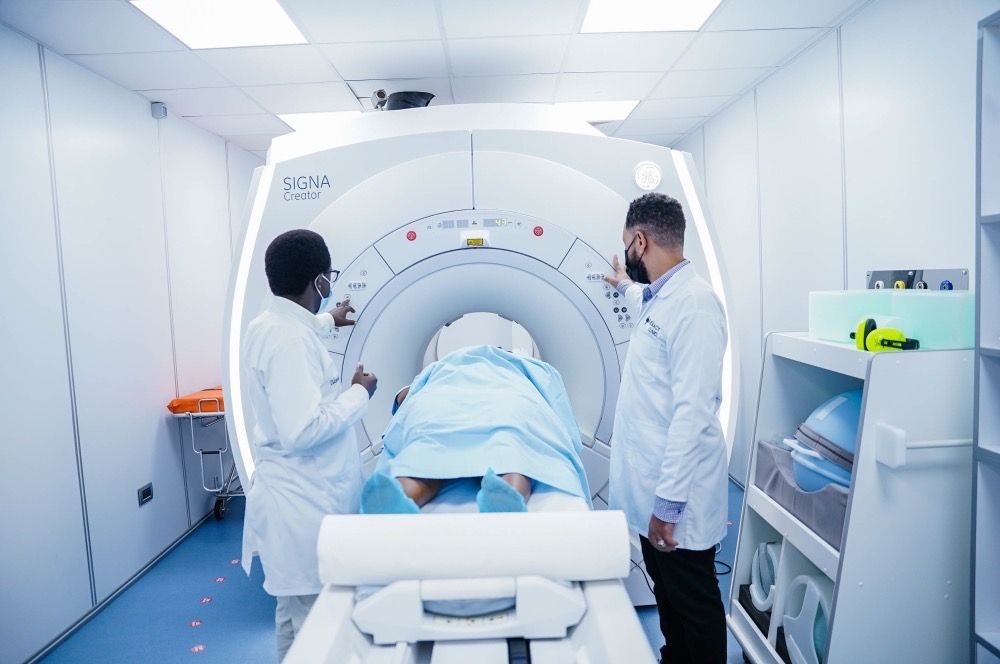

Got fluids in the knees? Don’t move a muscle, I’ve got you covered! Well, not exactly I but a doctor I know who, when he meets you, will make you feel happy that you got those nasty ‘waters’!
He is a man of many hats but I’ll only refer to two that I know. Which he wears with a conduct that bespeaks the world-renown manner of Rwanda’s national army, the RDF. It’s a manner of general sympathy and empathy for which, as a member, the doctor is a personification.
It contradicts the commonly held view in another of his fields where it’s so necessary yet is believed so uncommon – the medical field. But relax: in his hands, that view vanishes.
The icing on his doctoring cake is that in whatever he does handling bone-related anything, he is accompanied by young men and women who seem to be interns. Even though, to be fair to them, they seem adept enough to do a good job. But it portends a future of more responsible specialised doctors and it’s thanks to the guidance of doctors like him for their honing of the knowledge.
Talking of whom reminds of another who, though not military, exudes compassion and patience par excellence. He is an orthopaedic surgeon much as such doctors do much more.
Problem is that practically every hospital in Kigali seems to need his services. Yet be it in King Faisal Hospital, Legacy Clinics, DMC Hospital or elsewhere, he will be the same amiable and reliable doctor he is when you meet him fresh in the morning when he is readying for work.
We’d all like to know their names, no doubt, but being of a self-effacing nature, they for sure wouldn’t care for a name mention. Just ask any Rwandan about an expert in their fields and you can be sure to be referred to them.
Why mention only these orthopaedic specialists? Certainly, there are countless other kind doctors in general medicine, emergency, other areas. You must have heard of many caring paediatricians, ophthalmologists, psychiatrists, rheumatologists, oncologists, dermatologists, and others but, in my view, few stand out like those two.
Our bias is borne of the fact that there are many health centres, dispensaries, clinics, and hospitals that are manned by doctors who look at patients as if they are something that the cat dragged in! Stories of patients who have got their conditions worsened or were neglected to the point of succumbing to death do exist. Bizarrely, these include doctors in private practice, although for sure public health institutions seem to be victims to a lion’s share.
Our consolation is that the number of exemplary doctors is growing by leaps and bounds and shaming the bad apples. This fact is also helped by the hawkish eye of the law, whose claws will not miss you if you neglect patients to a point where they suffer, at best, unnecessary harm, at worst, death.
Woe befall thee, heartless doctor, if such is to happen under your watch!
On the reverse side of the coin, there are stone-hearted doctors who left public hospitals and, on joining private practice, miraculously transformed overnight. To this day, what led to this change of conduct remains a mystery for an acquaintance many called a "quack” for his bearing.
However, the stars are arranged for a brighter future for Rwandans who have been yearning for only gallant doctors. The heartless ones are going to start working in such spotless premises that they will be afraid to ‘soil’ them with dirty hearts!
What am I on about? Visit the premises where said ‘waters’ doctor sometimes works and you’ll get my drift. You cannot tell it’s a hospital. You’ll take it for a five-star hotel. Well, it may seem to be short on equipment but that’s a matter of time.
And it’s not alone. For instance, you cannot operate kidney transplants in a dingy, ‘Nyakatsi’ King Faisal Hospital. Moreover, you can be sure that once the new expansive premises nearing completion are done for CHUK to move there, it will give these other public and private hospitals a run for their money. So will the soon-to-be-its-neighbouring IRCAD for treatment of heart problems.
Anyway, why rack our brains thinking of clean hospitals in Kigali, when two examples suffice? If you can have a first-rate hospital in once remote and totally inaccessible Nshiri Commune, what other surprises do you want in today’s Rwanda? Munini Hospital in what is today Nyaruguru District, who’d have thought it possible?
Others like Shyira or the one-and-only regional Butaro Cancer Centre of Excellence, no surprises there. It’s now as if they’ve been here forever.
But then again, what’s to be expected of a country that was devoid of any hospital to speak of in 1994 but in a mere two decades plus is one of only a few African countries manufacturing vaccines and drugs? And is churning out fresh doctors out of universities every year, having just delivered 238 this year alone?
All the above speak to the fact of a country on the run to attract health tourism. In addition to other tourist attractions.


